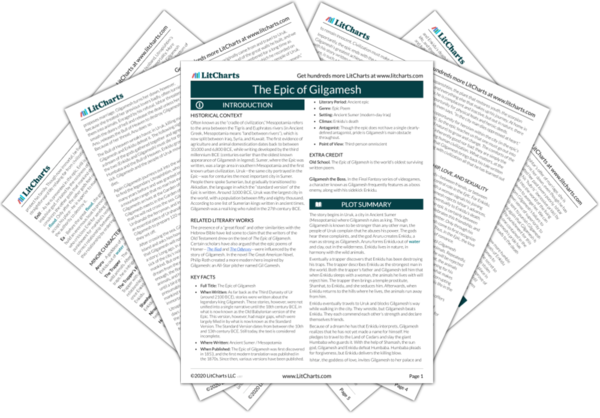Summary
Analysis
To get the sympathy and attention of the gods, Utnapishtim tells Gilgamesh that he must stay awake for six days and seven nights. As Gilgamesh sits and waits, he is tempted by sleep. Utnapishtim discusses Gilgamesh’s challenge with his wife, who is skeptical that Gilgamesh will stay awake. Utnapishtim tells his wife to bake bread, and to each day place a loaf by Gilgamesh’s head, and to make marks on the wall to count how many days he has stayed awake. On the seventh day, Utnapishtim wakes Gilgamesh, who says he hardly slept. But Utnapishtim tells Gilgamesh to look at the loaves of bread beside him, which are either tough, soggy, mildew-infested, or moldy—Gilgamesh has been asleep. Only the most recent loaf is fresh. Gilgamesh asks Utnapishtim what he should do to overcome his fear of death.
Unlike Gilgamesh’s previous challenges out in nature, the one Utnapishtim suggests has nothing to do with physical strength. Instead, it focuses on a unique need of mortals: necessity of sleep. No matter how much Gilgamesh has trained or fought or practiced, it is unlikely that any man could make himself stay awake for seven days. It is precisely his humanity that makes him fail the test.
Themes
Utnapishtim banishes Urshanabi from ever returning to his shores, and orders Urshanabi to take Gilgamesh, “whose body is covered with foulness and the grace of whose limbs has been spoiled by wild skins” and to bring him to the “washing-place.” There, Utnapishtim says, Gilgamesh will wash his hair and throw away his animal skins in order to reveal his natural beauty. Then Gilgamesh will be given new clothes to wear which will never tatter or age until he arrives to Uruk.
Utnapishtim tells Gilgamesh to take on a less luxurious, simpler appearance—essentially to distance himself from the comforts and fashions of the city. He believes that Gilgamesh has lost his sense of place in nature. Utnapishtim’s banishment of Urshanabi is unclear in its significance, but may be punishment for bringing a mortal to Utnapishtim’s shores.
Themes
Urshanabi takes Gilgamesh to the washing-place, where Gilgamesh washes his hair and throws away his skins. He is then given the clothing that will not age until he arrives back in Uruk. As Gilgamesh and Urshanabi set off in the boat, Utnapishtim’s wife tells Gilgamesh that if he finds and takes a special prickly plant that grows underwater, that plant can restore youth. Gilgamesh weighs himself down with rocks and walks along the riverbed underwater. He sees the plant growing, and though it pricks him, he takes it and cuts the rocks from his feet. The sea takes him back to shore.
It is no coincidence that the plant that restores youth grows on the seafloor. In the Epic, water is often a symbol of rejuvenation, and here we see that the secret to everlasting youth grows in the water. It seems that at last Gilgamesh has found a way to achieve immortality through some heroic action of his own.
Themes
Gilgamesh tells Urshanabi that the plant he has can restore youth, and that he will take it back to Uruk for the elderly to eat. They set out in the boat and travel back across the sea, and then journey together towards Uruk. On the first night, Gilgamesh finds a cool well and bathes in it. There is a serpent there who can sense the presence of the plant. The serpent jumps out of the water to snatch the plant away, and then it sheds its skin and goes back in the well. Gilgamesh laments to Urshanabi, asking why he has endured so much only to have the plant taken from him. The stream, he believes, must have already taken the plant far away.
Again, it is significant that the serpent comes from the water to steal the plant: the plant grew underwater, and there it is meant to return. A stream then carries it away. In the Epic, water comes to serve as a symbol of the impersonal will of nature: Gilgamesh can, fleetingly, possess the plant of youth, but ultimately his possession of it is out of his control—no action of his, no matter how heroic, can overcome the inevitability of his death. It’s also telling that the serpent is the creature who robs Gilgamesh of eternal life—just like in the Bible, where the snake tempts Adam and Eve to eat the forbidden fruit.
Themes
Get the entire Gilgamesh LitChart as a printable PDF.

In three days, the two reach Uruk. Gilgamesh tells Urshanabi about the city and asks him to climb up on the walls and inspect it for himself. Much of the construction was Gilgamesh’s doing, and Gilgamesh is proud of it. The narrator then tells us that Gilgamesh is long remembered for revealing the story of the days before the flood, and for returning from his journey with an engraved stone telling of everything that had happened.
With some finality we come to understand how Gilgamesh has arrived at peace with his own mortality. Whereas at the beginning of the story he aimed only to make a name for himself, now he is proud of the great walls he built (which protect the people of Uruk, and again show the benefits of civilization) and for sharing his story through writing (which provides wisdom to the people of Uruk—and even to readers thousands of years later). Instead of being famed only for selfish deeds, he will be long remembered for the good he did, even if eventually he will be forgotten like any other mortal.
Themes












